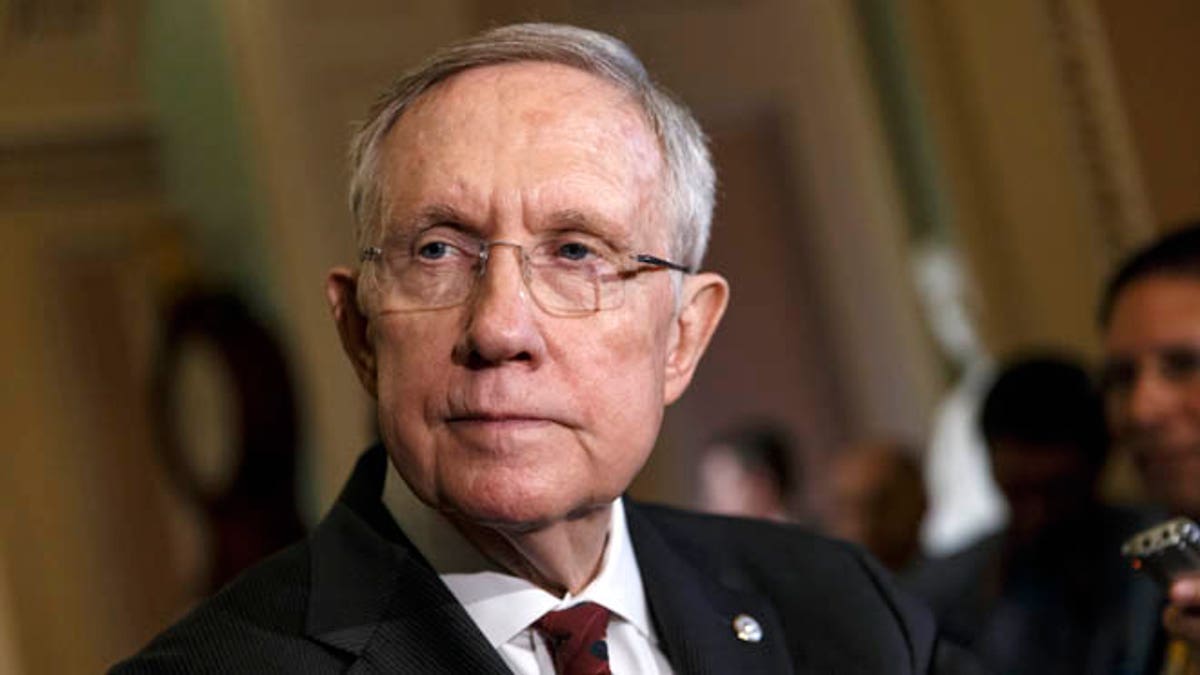
April 29, 2014: Senate Majority Leader Harry Reid talks to reporters on Capitol Hill in Washington. (AP)
With several red-state Democrats facing tough re-elections in November, Majority Leader Harry Reid is under pressure to have the Senate vote to kickstart the Canada-to-Texas Keystone XL pipeline.
Reid would undoubtedly prefer a non-binding "sense of the Senate" resolution -- a measure voicing support for the pipeline with no real teeth -- to give his members political cover without forcing the issue on the White House.
But Republicans, and at least some Democrats, want something with force behind it. One such bipartisan bill to approve the pipeline was introduced Thursday. Reid has not yet telegraphed what he'll allow, with a vote potentially just days away.
"Originally, it was supposed to be a sense of the Senate. Now they said they want it an up or down on a piece of legislation. They can't decide what it is," Reid told reporters. "I'm open to anything that will move energy efficiency."
That's a reference to a bipartisan energy efficiency bill in the Senate sponsored by New Hampshire Democratic Sen. Jeanne Shaheen and Ohio Republican Sen. Rob Portman, which will be debated and is expected to come up for a vote next week.
That's the debate where some lawmakers want to squeeze in Keystone.
"In that debate, we ought to have a binding vote on the Keystone pipeline that would force that issue of the American people," South Dakota Republican Sen. John Thune told reporters. "We actually ought to have a vote that matters."
After the Obama administration once again punted on a Keystone decision last month, Reid is facing calls for congressional action from his left and right flanks.
Among the at-risk 2014 Democrats is Louisiana Sen. Mary Landrieu, who appears to be out of patience with the White House and Reid after the pipeline has been studied for more than five years.
"The Keystone Pipeline is clearly in our national interest and vital to position North America as an energy powerhouse," Landrieu, who co-sponsored the latest bill, said. "I will press hard for a vote in the coming weeks to build this pipeline."
White House Press Secretary Jay Carney issued this warning to lawmakers: "What we've seen in the past when Congress has passed legislation it has actually slowed the process down. So we believe this has to be run by the book outside of politics and that's the way it's being run."
Critics would question whether Keystone XL is truly beyond politics at this stage.
The Senate already is on the record in support of the pipeline -- passing a nonbinding resolution to approve the project during the Senate budget process in March 2013, in a 62-37 vote.
Over in the Republican-controlled House, there remains strong support for building the project.
Georgia Rep. John Barrow is a Democrat who is a vocal critic of the Obama administration on this issue.
"I think they have it all wrong: Further delays in constructing this pipeline mean that the U.S. will miss out on tens of thousands of jobs and continue to depend on foreign oil from hostile countries," Barrow said. "The Keystone XL Pipeline will bring in 840,000 barrels of oil per day from our friend and neighbor, Canada. That could essentially replace the 900,000 barrels we have to get every day from Venezuela - one country we cannot count on."
Barrow says the oil will be extracted, refined, and used by someone. His question: who will be first in line to use it?
Capitol Attitude is a weekly column written by members of the Fox News Capitol Hill team. Their articles take you inside the halls of Congress, and cover the spectrum of policy issues being introduced, debated and voted on there.





















